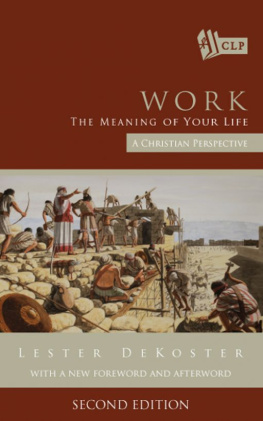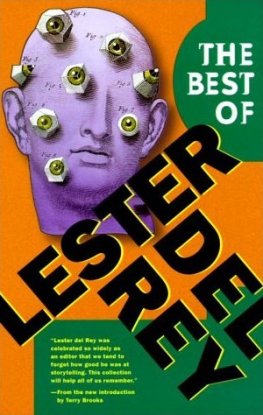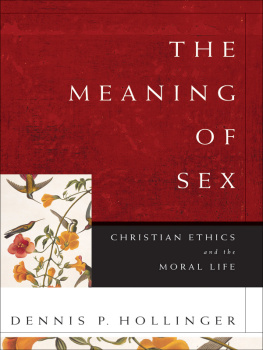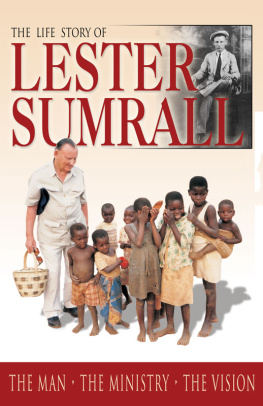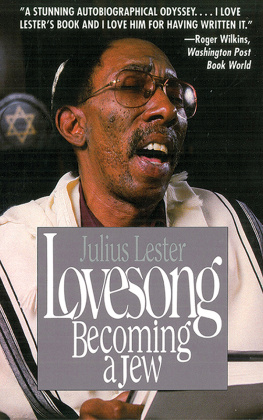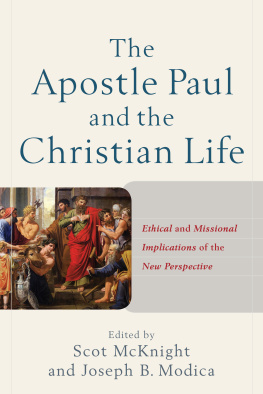Lester DeKoster - Work: The Meaning of Your Life: A Christian Perspective
Here you can read online Lester DeKoster - Work: The Meaning of Your Life: A Christian Perspective full text of the book (entire story) in english for free. Download pdf and epub, get meaning, cover and reviews about this ebook. year: 1982, publisher: Smashwords, genre: Religion. Description of the work, (preface) as well as reviews are available. Best literature library LitArk.com created for fans of good reading and offers a wide selection of genres:
Romance novel
Science fiction
Adventure
Detective
Science
History
Home and family
Prose
Art
Politics
Computer
Non-fiction
Religion
Business
Children
Humor
Choose a favorite category and find really read worthwhile books. Enjoy immersion in the world of imagination, feel the emotions of the characters or learn something new for yourself, make an fascinating discovery.
- Book:Work: The Meaning of Your Life: A Christian Perspective
- Author:
- Publisher:Smashwords
- Genre:
- Year:1982
- Rating:5 / 5
- Favourites:Add to favourites
- Your mark:
- 100
- 1
- 2
- 3
- 4
- 5
Work: The Meaning of Your Life: A Christian Perspective: summary, description and annotation
We offer to read an annotation, description, summary or preface (depends on what the author of the book "Work: The Meaning of Your Life: A Christian Perspective" wrote himself). If you haven't found the necessary information about the book — write in the comments, we will try to find it.
Work: The Meaning of Your Life: A Christian Perspective — read online for free the complete book (whole text) full work
Below is the text of the book, divided by pages. System saving the place of the last page read, allows you to conveniently read the book "Work: The Meaning of Your Life: A Christian Perspective" online for free, without having to search again every time where you left off. Put a bookmark, and you can go to the page where you finished reading at any time.
Font size:
Interval:
Bookmark:
* * * * *
WORK
THE MEANING OF YOURLIFE
A CHRISTIANPERSPECTIVE
Lester DeKoster
Foreword by Stephen J. Grabill
Afterword by The Oikonomia Network

Smashwords Edition
Copyright 1982 by Lester DeKoster(1916-2009)
An imprint of the Acton Institute for theStudy of Religion & Liberty
Edition License Notes
This ebook is licensed for your personalenjoyment only. This ebook may not be re-sold or given away toother people. If you would like to share this book with anotherperson, please purchase an additional copy for each person youshare it with. If you're reading this book and did not purchase it,or it was not purchased for your use only, then you should returnto Smashwords.com and purchase your own copy. Thank you forrespecting the author's work.
* * * * *
* * * * *
CONTENTS
Foreword
About the Authors
* * * * *
The staying power of Lester DeKosters littlebooklet is due to his foresight in seeing work as a manifestationof whole-life discipleship. You can find countless authors writingabout the ills of the workplace, better ways to manage time andresources, daily planning and organizational practices, the moralcharacter of the worker, workplace ethics, and so on, but few evertake up the theological significance of work itself. And even fewerstill, slow down long enough to reflect on the spirituality and economics of work from a macro-levelperspective. Not so with Lester DeKoster; he probes these topicswith his characteristic wit, keen intellect, and rhetorical acumen.The result is a book with mass appeal and convicting power that isstill insightful twenty-eight years after its originalpublication.
Why is this the case? It is because he staysfocused on a perennial question, Does work give meaning to life?His resounding affirmation uncovers three essential insights thatmake this book a must read for anyone who has ever wondered whetherwork is really a divine institution and not merely a necessaryevil.
The first insight is that work, indeed, givesmeaning to life because it is the form in which we make ourselvesuseful to others, and thus to God. God accomplishes his purposes inthe world by equipping us with talents, skills, and abilities thathe expects us to use in service to others.
The second insight, building on thecollective wisdom of the free-market tradition, is that our workshares in weaving civilization, which is the form in which othersmake themselves useful to us, by providing us with the tools fordoing our work well. This is reminiscent of Adam Smiths famousremark about the brewer, the butcher, and the baker in the Wealth of Nations (Bk. III, chap. 1).
And, finally, work sculpts the kind of selfwe are becoming through the choices we make in the handling of ourtalents on the job. DeKoster writes: The chisel we use to sculptour selves is choice. Its not a chisel of our own making: its atool we cant avoid using. Selves are formed into sheep or goat bythe god we serve in the choices we make in all of life.
Evangelicals have always had an implicitsense that work is good because it carries out the culturalmandate, but rarely, if ever, have they thought of work as one ofthe core elements of discipleship and spiritual formation. In fact,one of the most pressing needs among evangelicals today is torevive a commitment to whole-life discipleship. Christianity isabout so much more than what happens for an hour or two on Sundaymorning; its a way of life and it affects every area of our lives,including our working life.
With the passing of Lester DeKoster in 2009,the Acton Institute assumed the leadership of Christians LibraryPress, the imprint that Lester DeKoster and Gerard Berghoef foundedin 1979. Given the Acton Institutes interest in the relationshipbetween work, stewardship, and economicsin other words, biblical oikonomia it makes sense for us to issue asecond edition of Work: The Meaning of YourLif e, in various formats fit for a new generation. Thesecond edition features a new Foreword and Afterword, the latter ofwhich is an excerpt of The Oikonomia Networks longer Manifesto(Whatever You Do: Why Discipleship Is Witheringand What We Can DoAbout It). This new edition also includes a light edit and updateof the text, as well as the alteration of biblical citations fromthe Revised Standard Version in the first edition to the NewInternational Version of Scripture now in the second edition.
My hope is simple: Read and understand, andpray that God will open the windows of heaven to bring about arevolution in seminary education and church life in our day, onethat will finally mobilize the whole people of God to grasp thefull implication of Colossians 3:2324: Whatever you do, work atit with all your heart, as working for the Lord, not for men, sinceyou know that you will receive an inheritance from the Lord as areward. It is the Lord Christ you are serving.
Stephen J. Grabill, Ph.D.
Senior Research Scholar in Theology
Acton Institute
General Editor
NIV Stewardship Study Bible
* * * * *
Work gets the largest single block of ourlives.
Yet we tend to look for meaningful livinganywhere but on the job.
We work daily for the paycheck that tries tokeep necessity at bay and provides us enough leisure besides topursue what seems to give meaning to our existence.
We dont quite work just to eat nor eat justto workat least we dont want to. However, it often comes downnear to that, and time on the job is for too many of us time at therat racewith the rats winning.
Sometimes we pause to wonder: Is this, then,what life amounts toa wilderness of work broken with oases ofmeaning furnished by our families, the church, politics, communityaffairs, plus hobbies and spectator sports thrown in to give somezest to leisure?
Is this it?
I used to think so. Do you now?
Not that most of us expect to make some bigsplash in the newsthose who do are soon eclipsed by new faces onour TV screens anyhow. Who was who, just yesterday? We do cravesensing, somehow, that we count for more than we can control withour income or do with our spare time. Our hearts whisper that life must have some meaning besides the poetsgetting and spending.
One day two things dawned on me: (1) If lifeis to have meaning, I would have to find it, not hope to create itfor myself. (2) Living must get its meaning, first of all, on thejob, because thats the drain down in which the best hours of everyweek dribble away.
At first, these options seemed fanciful:Lifes meaning on the job? Not because I put it there, but because work endows living with significance?Kidding somebody?
No kidding at all. Thats the way it is. Comealong and see for yourself!
Looking back, I noticed that I had made thislittle adventure in perception without going anywhere inparticularleading me also to think that the most importantjourneys we can take are those that shift our outlook, right athome. Not too far to travel!
I write this booklet so that you can share,if you want to, the same discovery: It is your daily work, whatever your job, that does give meaning to yourlife, not because you will now decide to put meaning there butbecause God has already done so.
And what, by the way, is meant here bymeaning?
Meaning is the answer to the what fors oflife. Why work? Why play? Why do anything at all? What is it allabout? Such queries probe for meaning, no less in the lives of thejet set than in those of the frustrated and poor. Meaning getsrounded out, of course, beyond the jobin our families, ourreligious and community activities, our friends, and on vacations,dabbling with our hobbies, and so forth. However, working takes thecore of the week for most of us, and if the job drains life ofmeaning then all else is shadowed toohow heavy hangs next Mondaymorning over the whole weekend for the many who loathe theirjobs.
Next pageFont size:
Interval:
Bookmark:
Similar books «Work: The Meaning of Your Life: A Christian Perspective»
Look at similar books to Work: The Meaning of Your Life: A Christian Perspective. We have selected literature similar in name and meaning in the hope of providing readers with more options to find new, interesting, not yet read works.
Discussion, reviews of the book Work: The Meaning of Your Life: A Christian Perspective and just readers' own opinions. Leave your comments, write what you think about the work, its meaning or the main characters. Specify what exactly you liked and what you didn't like, and why you think so.

